About the 2021 Institute
We have managed, for the second consecutive year, to hold a productive and energizing Institute for seven teams from across the Five Colleges of Ohio. As in the past, participants valued the dedicated time with their teams to work on their pedagogical projects, and no pandemic would keep us from that work. Additionally, we once again borrowed energy from among our consortial colleagues through our daily group-wide check-ins and (almost daily) workshops. CODEX, again proved to be a place where good ideas come to grow even stronger.
Our CODEX cohort convened, for the most part, virtually. Some of the teams with colocated members met together according to their local campus’s safety protocols and joined the larger meetings as satellite locations. Mostly, though, we interacted with one another through our computer screens, making the most of our platforms’ flexibility while still longing for in-person collaborations.
2021 CODEX Teams
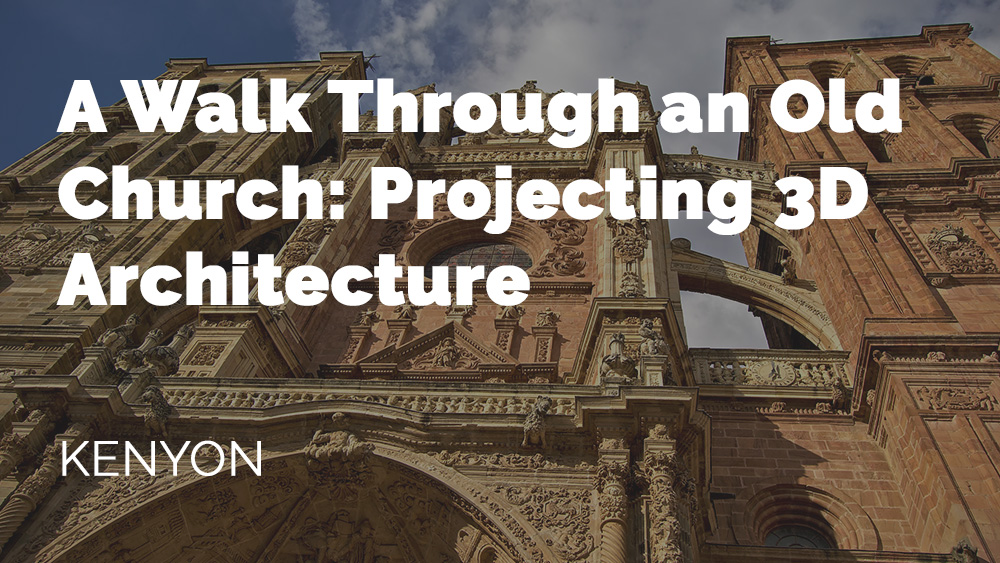
A Walk Through an Old Church: Projecting 3D Architecture (Kenyon College)
The team will devote time to exploring the use of 3D modeling to project architectural models in an innovative immersive classroom situated within Kenyon College’s new Chalmers Library for the purpose of studying Late Gothic and Romanesque architecture. Team members will collaborate on lesson plans that aim to engage students with these models in ways that promote new perspectives on this period.
Team Members:
- Sarah Blick, Professor of Art History
- Jenna Nolt, Digital Initiatives Librarian
- Yan Zhou, Adjust Assistant Professor of Art History and Visual Resources Curator
- Henry Allan, Student
- Cheran De Silva, Student
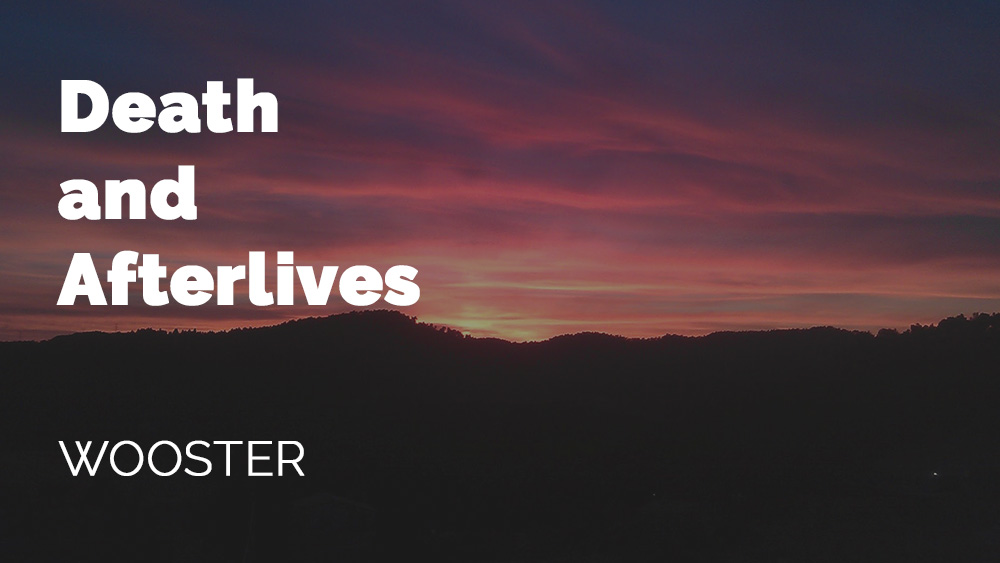
Death and Afterlives (College of Wooster)
Building on previous efforts to connect students’ studies of different conceptions of death and the afterlife to the present needs of community organizations, the team will develop new learning goals and community-centered assignments that promote digital literacies by asking students to develop resources that meet the needs of those community partners that they identify through the course.
Team Members:
- Bhakti Mamtora, Assistant Professor of Religious Studies and South Asian Studies
- Megan Smeznik, Educational Technologist
- Jenna Smith, Student
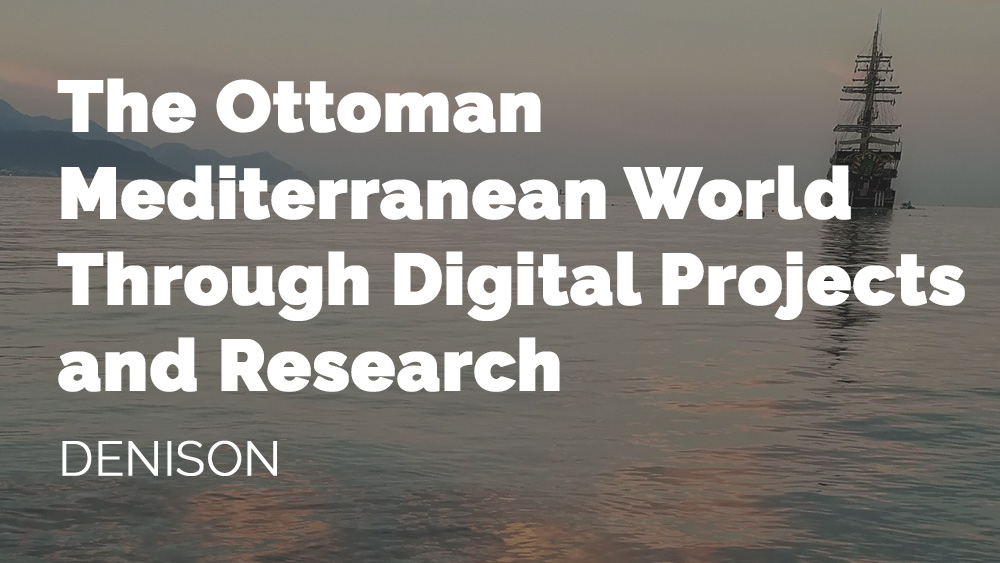
The Ottoman Mediterranean World Through Digital Projects and Research (Denison University)
Based on successful outcomes from an assignment conceived at the 2020 CODEX Summer Institute, the team will expand the assignment into a semester-long project in which students collaborate on developing digital timelines, maps, and longer form story maps that collectively help to contextualize the historical periods in which the captivity narratives they are studying were written. Students will be challenged to consider these texts as data and to visualize those data in digital platforms such as TimelineJS and ArcGIS Story Maps.
Team Members:
- Hoda Yousef, Assistant Professor of History
- Trent Edmunds, Instructional Technologist
- Donnie Sendelbach, Director of Educational Technology Services
- Sarah Kovacic, Student
- Carter Patton, Student
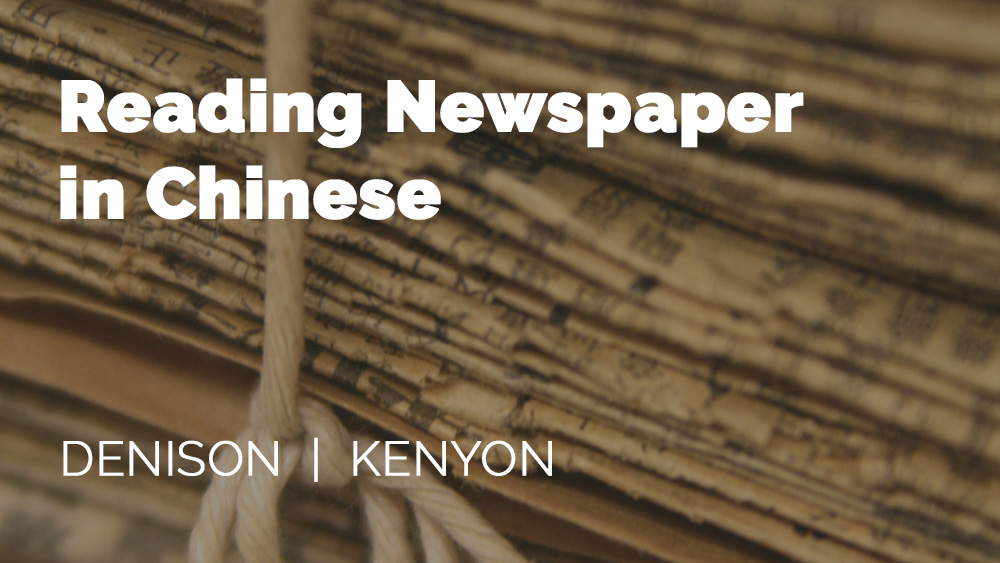
Reading Newspaper in Chinese (Kenyon College and Denison University)
Learners of Chinese face a problem unique to this “difficult” language: the divide between spoken and written Chinese. Using Chinese newspapers as a source, the team will develop assignments and activities that ask students to perform close reading of these more informal texts with the help of textual analysis and digital annotation tools that promote recognition of linguistic patterns and, ultimately, improved competence in formal writing.
Team Members:
- Jianhua Bai, Professor of Chinese
- Xinda Lian, Professor of Chinese
- Cheryl Johnson, Instructional Technologist
- Mari Holben, Student
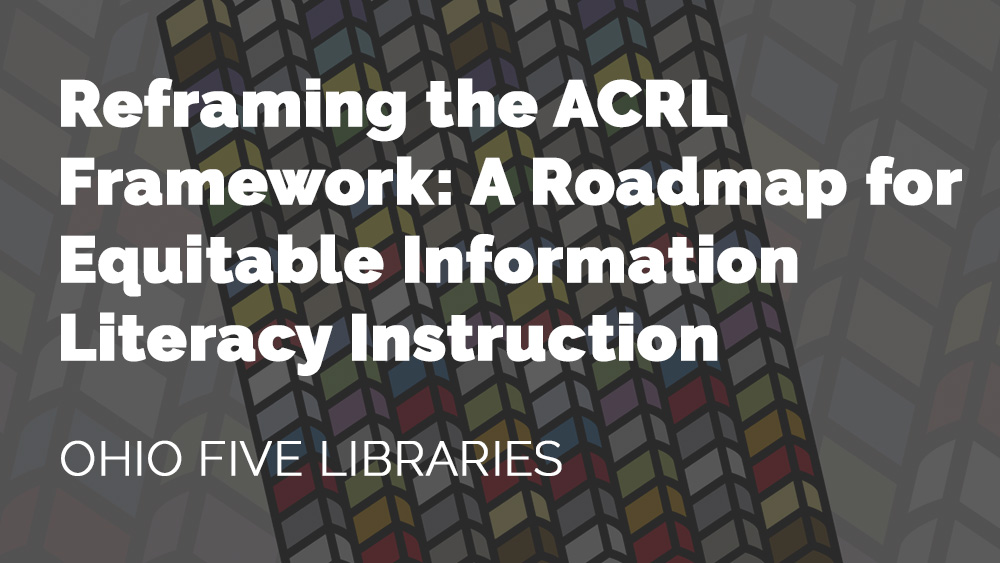
Reframing the ACRL Framework: A Roadmap for Equitable Information Literacy Instruction (Ohio Five Libraries)
Despite the internet’s original intent of being an equalizer, the online environment is also rife with bias, misogyny, racism, homophobia and many other oppressive ideologies. Ohio Five instruction librarians are working from a shared desire to create learning objects based on the
ACRL Framework for Information Literacy in order to provide students with a deeper understanding of inequity and racism through the lens of media and information literacy. The team will work together to determine learning outcomes, corresponding assessments, and a scaffolded outline in which to implement an equity-based information literacy learning program across the disciplines and across our campuses.
Team Members:
- Alonso Avila, Information Literacy and Student Success Librarian, Oberlin College
- Annie Dempsey, Learner Experience Librarian, College of Wooster
- Liz Lang, Public Services Librarian, Ohio Wesleyan University
- Lisa Morrison, Social Sciences Liaison Librarian, Denison University
- Shannon Simpson, Scholarly Instruction Librarian, Kenyon College
- Elizabeth Sullivan, Assessment and User Experience Librarian, Oberlin College
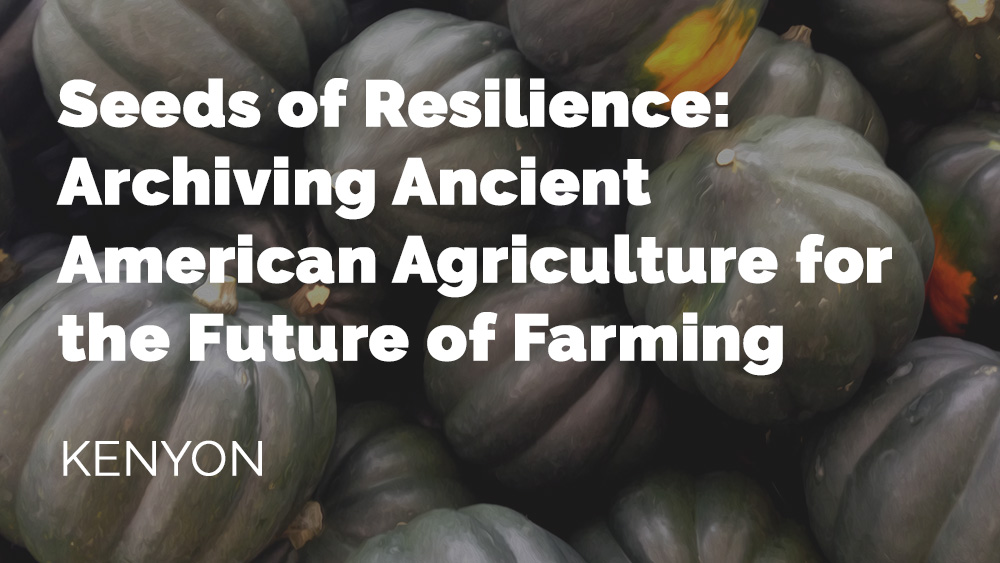
Seeds of Resilience: Archiving Ancient American Agriculture for the Future of Farming (Kenyon College)
To complement a physical library of heirloom, native, and Indigenous seed varieties, the team will be designing an accompanying digital database intended to support student research on Indigenous peoples and agriculture. The team will devote time to planning course-based assignments and co-curricular opportunities that promote expansion of the project over time to include cross-disciplinary student and faculty research projects, histories, community stories, growing tips, maps, and more.
Team Members:
- Patrick Bottiger, Associate Professor of History
- Jenna Nolt, Digital Initiatives Librarian
- Zoë Packel, Student
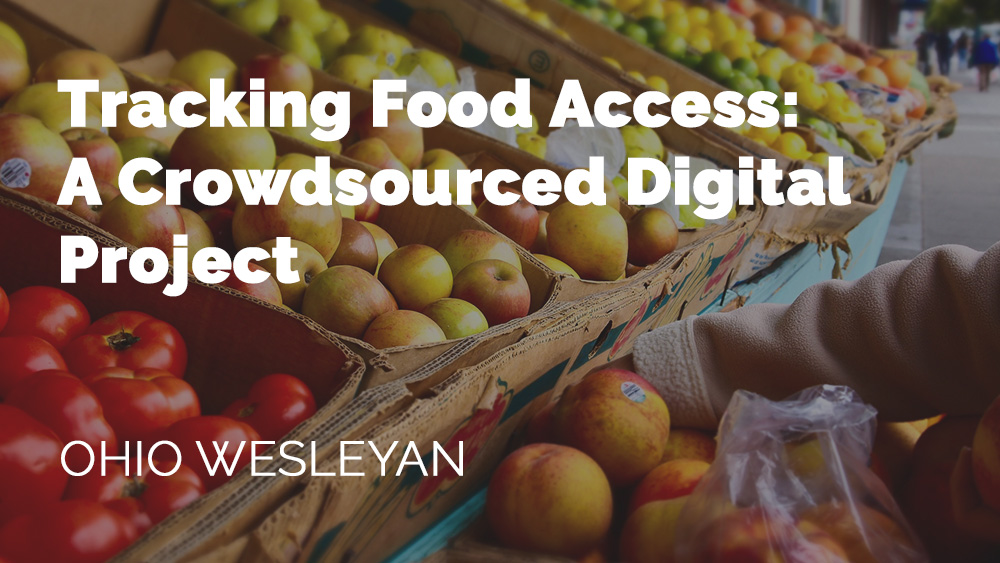
Tracking Food Access: A Crowdsourced Digital Project (Ohio Wesleyan University)
Through the lens of food and environmental justice initiatives, the team will collaborate on the design of a digital project that tracks modes of food access broadly across the United States. The team will identify shared learning goals and develop assignments that challenge students to develop skills in data collection and analysis, as well as the presentation of their analyses to a public audience. In addition, the group will identify, test, and prototype digital platforms suited to their learning goals. While the team’s initial focus is rightly on their own students, they plan to expand the scope of contributors to the general public in later phases of the project.
Team Members:
- Ashley Allen, Visiting Assistant Professor of Geography
- Christopher Fink, Associate Professor of Health and Human Kinetics
- Elizabeth Nix, Assistant Professor of Nutrition
- Kathryn Burns, Student
- Lauren Mussenden, Student
2021 CODEX Institute Workshops
Quickstart Guide to Public Facing Projects
- Heather Fitz Gibbon, professor in Sociology and Anthropology, and Chair of Urban Studies at Wooster (StoryMaps Slides)
- Megan Mitchell, Academic Engagement & Digital Initiatives Coordinator at Oberlin (Scalar Presentation Slides, Scalar Handout)
- Alex Alderman, Instructional Designer at Kenyon (WordPress Slides)
Even projects that are not built on digital infrastructure sometimes require a public-facing, web-based portal to communicate with an outside world. This trio of demonstrations will provide overviews of three low-barrier web platforms, as well as a few of the practical “first steps” to get you going on each. Heather Fitz Gibbon will demonstrate ESRI StoryMaps, which is a map-based tool; Megan Mitchell will present on Scalar, a “digital book” platform; and Alex Alderman will present on WordPress, a familiar template based website builder.
What am I Actually Doing? Decolonizing Power in Digital Pedagogy Projects
- Jade Davis, Director of Educational Technology & Learning Management at the University of Pennsylvania
- Presentation Slides
- In this workshop, we will explore the positions of power embedded in collaborative knowledge creation projects, our positions of power as individuals, and how acknowledging these positions of power is a key to cultivating empowerment, agency, and unexpected possibilities when doing digital work. We will begin to develop practices and strategies, from the syllabus through completion of research and projects, that acknowledge our limits, facilitate transparency, and celebrate collective potential for our work.
Open Pedagogy for an Open Future
- Led by Robin DeRosa, Director of the Open Learning & Teaching Collaborative, Plymouth State University
- Presentation Slides
In this presentation, Robin considers the foundational values that comprise Open Education, and explores how Open Educational Resources (OER), open pedagogy, and open access to research can offer us a way to recenter learners and their needs in the “postcovid” university. By focusing on the concrete work that faculty do in teaching, research, and service, Robin explores how we can better align the contours of our daily practices with the missions of our institutions, and how those institutions could be reshaped through our work to better serve students and the public in higher education’s next generation
2021 CODEX Summer Institute Schedule
9:00am – 10:15am
- Welcoming remarks from CODEX Summer Institute Co-Directors Jacob Heil and Heather Fitz Gibbon
- Review of the daily schedule and plans for the week
- Team Sharing: each team will share their course/project proposals and the goals they have set for the week.
10:30am – Noon
- Team time
This is an open time for team members to work together or individually on their projects. Teams may choose how best to conduct their work during this open session. Some may choose to meet for the entire period while others may choose to meet briefly to discuss individual responsibilities before proceeding with individual contributions and communicating via Slack or email. Teams may use their preferred communication tools (e.g. Google Meet, Microsoft Teams, Zoom, Slack) during this period.
Noon – 1:30pm
- Lunch on your own
1:30pm – 2:30pm
- “Quickstart Guide to Public-Facing Projects”
- Led by Heather Fitz Gibbon, professor in Sociology and Anthropology, and Chair of Urban Studies at Wooster; Megan Mitchell, Academic Engagement & Digital Initiatives Coordinator at Oberlin; and Alex Alderman, Instructional Designer at Kenyon
Even projects that are not built on digital infrastructure sometimes require a public-facing, web-based portal to communicate with an outside world. This trio of demonstrations will provide overviews of three low-barrier web platforms, as well as a few of the practical “first steps” to get you going on each. Heather Fitz Gibbon will demonstrate ESRI StoryMaps, which is a map-based tool; Megan Mitchell will present on Scalar, a “digital book” platform; and Alex Alderman will present on WordPress, a familiar template based website builder.
2:30pm – 4:00pm
- Flexible period
This time may include follow-up consultations with the workshop facilitator, additional pop-up workshops offered by attendees in response to needs of their team or the larger community, additional team time, or just individual work time.
4:00pm – 5:00pm
- CODEX Forums
Facilitated discussion on topics selected by the cohort
9:00am – 9:30am
-
- Morning announcements
9:30am – Noon
- As in the previous day, this is an open time for teams to work together or individually on their projects. Teams may also use this time to consult with other teams or with the institute’s directors.
Noon – 1:30pm
- Lunch on your own
1:30pm – 3:00pm
-
- “What am I Actually Doing? Decolonizing Power in Digital Pedagogy Projects”
- Led by Jade Davis, Director of Educational Technology & Learning Management at the University of Pennsylvania
In this workshop, we will explore the positions of power embedded in collaborative knowledge creation projects, our positions of power as individuals, and how acknowledging these positions of power is a key to cultivating empowerment, agency, and unexpected possibilities when doing digital work. We will begin to develop practices and strategies, from the syllabus through completion of research and projects, that acknowledge our limits, facilitate transparency, and celebrate collective potential for our work.
3:00pm – 4:00pm
-
- Flexible period
This time may include follow-up consultations with the afternoon’s workshop facilitator, additional pop-up workshops offered by attendees in response to needs of their team or the larger community, additional team time, or just individual work time.
4:00pm – 5:00pm
-
- CODEX Forums
Facilitated discussion on topics selected by the cohort
9:00am – 9:30am
- Morning announcements
9:30am – Noon
- Team time
As in the previous days, this is an open time for teams to work together or individually on their projects. Teams may also use this time to consult with one or more CODEX Mentors on project-specific questions.
Noon – 1:30pm
- Lunch on your own
1:30pm – 3:00pm
- “Open Pedagogy for a Hopeful Future”
- Led by Robin DeRosa, Director of the Open Learning & Teaching Collaborative, Plymouth State University
In this presentation, Robin will consider the foundational values that comprise Open Education, and explore how Open Educational Resources (OER), open pedagogy, and open access to research can offer us a way to recenter learners and their needs in the “postcovid” university. By focusing on the concrete work that faculty do in teaching, research, and service, Robin will explore how we can better align the contours of our daily practices with the missions of our institutions, and how those institutions could be reshaped through our work to better serve students and the public in higher education’s next generation.
3:00pm – 4:00pm
- Flexible period
This time may include follow-up consultations with the afternoon’s workshop facilitator, additional pop-up workshops offered by attendees in response to needs of their team or the larger community, additional team time, or just individual work time.
4:00pm – 5:00pm
- CODEX Forums
Facilitated discussion on topics selected by the cohort
9:00am – 9:30am
- Morning announcements
9:30am – Noon
- Team time
As in the previous days, this is an open time for teams to work together or individually on their projects. Teams may also use this time to consult with one or more CODEX Mentors on project-specific questions.
Noon – 1:30pm
- Lunch on your own
1:30pm – 4:00pm
- Team Time
This time may include follow-up consultations with the afternoon’s workshop facilitator, additional pop-up workshops offered by attendees in response to needs of their team or the larger community, additional team time, or just individual work time.
4:00pm – 5:00pm
- CODEX Forums
Facilitated discussion on topics selected by the cohort.
9:00am – 9:15am
- Morning announcements
9:15am – 10:30am
- Team time
As in the previous days, this is an open time for teams to work together or individually on their projects. Teams may also use this time to consult with one or more CODEX Mentors on project-specific questions.
10:30am – Noon
- 2021 CODEX Summer Institute Showcase
Teams will present their progress and share their plans and timelines for carrying forward their courses and projects in subsequent semesters.
Concluding remarks by CODEX Summer Institute Directors Jacob Heil and Heather Fitz Gibbon
Co-Directors Jacob Heil and Heather Fitz Gibbon will be available during virtual office hours between 10:30am – 4pm Monday through Thursday during the institute.